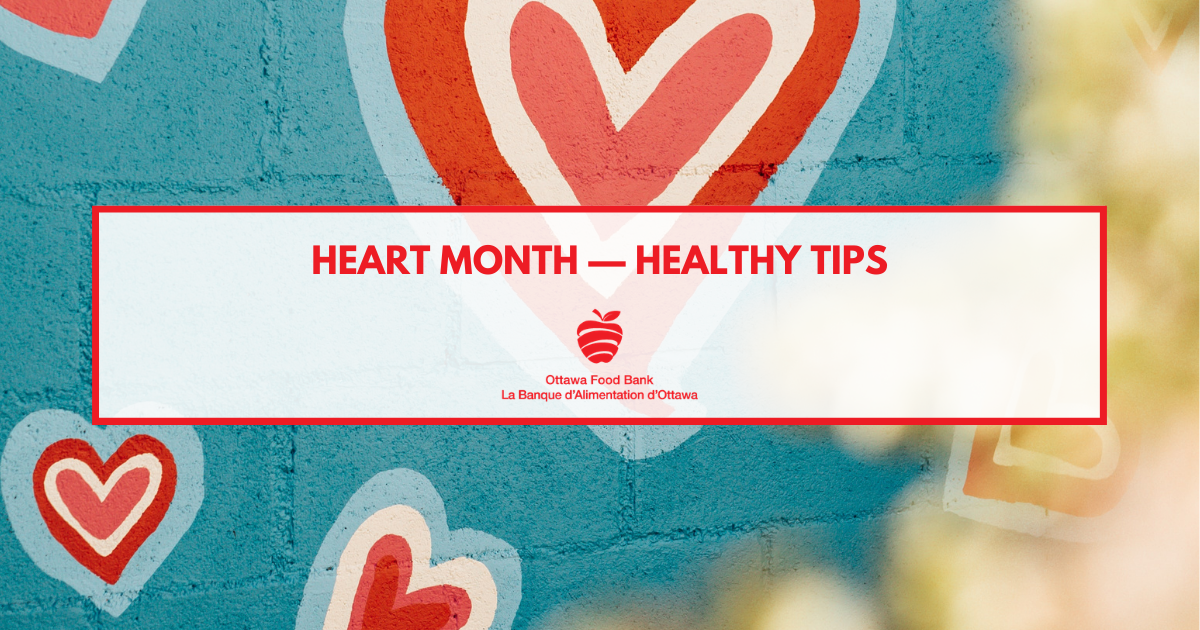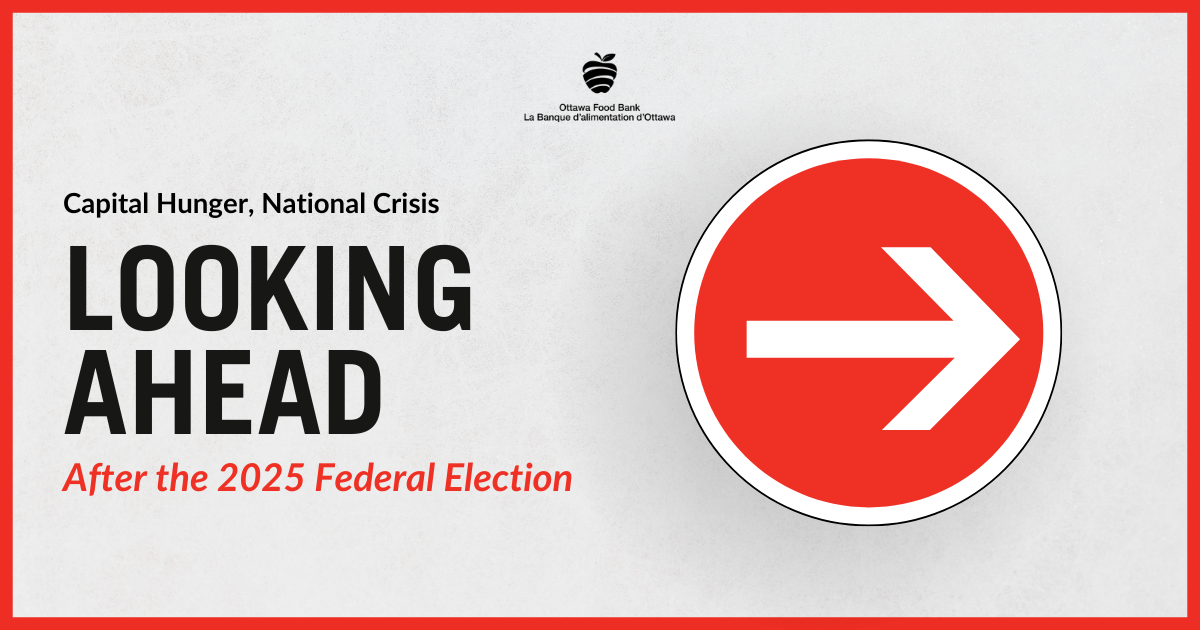Did you know that in line with Valentine’s Day, February is heart health month?
This month is dedicated to highlighting ways in which we can improve heart health.
The Ottawa Food Bank is committed to offering more unprocessed and healthful foods; with the help of the Black Family Farm, the Ottawa Food Banks provides 43% fresh foods to their member agencies.
Below are some tips to help you maintain a healthy heart!
Week #1 Tips
Eating vegetables and fruits daily can help decrease the risk of several nutrition-related chronic diseases, including heart disease.
Did you know that eating the peels of vegetables and fruits, whenever possible, will increase your total daily fibre intake? This helps keep your heart healthy!
Source: Heartandstroke.ca
Did you know that making water your drink of choice is a great way to stay hydrated! You can add some natural flavour to your water by adding fruits and spices!
Source: Canadian Food guide 2019
Did you know that frozen and canned vegetables and fruits contain similar amounts of nutrients and fibre as fresh vegetables and fruits? Just remember to rinse canned vegetables before using, to remove the extra salt.
Source: Canadian Food guide 2019.
Did you know that vegetables and fruits are full of phytonutrients that have been shown to reduce the risk of heart disease and stroke?
Try having fruits for a heart-healthy dessert or snack! Did you know apples have two different types of fibre that keep your heart healthy?
Source: heartandstroke.ca
Week #2 Tips
Whole grains are an important part of a healthy, balanced diet. They contain a high amount of vitamins, minerals and fibre. The fibre present in whole grains reduces the risk of many nutrition-related chronic diseases, such as heart disease and stroke.
Did you know that oats are whole grains? In fact, they contain fibre that helps to lower cholesterol, which is good for your heart!
Source:
https://www.unlockfood.ca/en/Articles/Fibre/Focus-on-Fibre.aspx
https://www.unlockfood.ca/en/Articles/Heart-Health/All-About-Oats.aspx
Look for products where heart healthy ingredients like “whole grain whole wheat flour“, “whole rye”, “whole oat”, “oatmeal”, “whole corn”, “whole barley” are at the start of the ingredient list.
Source:
https://www.unlockfood.ca/en/Articles/Cooking-Food-Preparation/Cooking-with-Whole-Grains.aspx
https://www.unlockfood.ca/en/Articles/Canada-s-Food-Guide/Choosing-Whole-Grains-FAQs.aspx
Switch out the rice! Brown rice is a whole grain that does not contain cholesterol, fat or sodium! Try choosing brown rice instead of white rice when you can.
Source: https://www.unlockfood.ca/en/Articles/Budget/All-About-Brown-Rice.aspx
Did you know that the words “whole grain” don’t necessarily mean high fibre?
Try checking the nutrition facts table, 2g of fibre or more per serving is considered a good source of fibre!
Source: https://www.unlockfood.ca/en/Articles/Cooking-Food-Preparation/Cooking-with-Whole-Grains.aspx
Did you know that eating more whole grains reduces your risk of heart disease, diabetes, cancer and digestive issues?
Source: https://www.unlockfood.ca/en/Articles/Heart-Health/All-About-Oats.aspx
https://www.unlockfood.ca/en/Articles/Budget/All-About-Brown-Rice.aspx
Week #3 Tips
Try switching up your main source of protein by adding more plant-based protein to your diet. Did you know that not only are they more affordable than meats, but they are also full of fibre, vitamins and minerals that help keep you and your heart healthy!
Did you know that plant-based proteins such as legumes, lentils and beans contain protein, fibre and heart-healthy fats?
Source:
https://www.unlockfood.ca/en/Articles/Protein/Introduction-To-Protein-And-High-Protein-Foods.aspx
Adding nuts and seeds to your diet is a good way to increase your intake of fibre and heart-healthy unsaturated fat!
Try adding some meatless meals into your diet to promote heart health! Check out this link for recipe inspiration!
Try choosing lean meats and skinless poultry more often.
Did you know that soy products like tofu and soy milk contain a similar quality of protein as cow milk, meat and eggs?
Bonus: The nutrients present in soy have been shown to have a positive effect on heart health as well as cholesterol and blood pressure.
Source:
https://www.unlockfood.ca/en/Articles/Vegetarian-and-Vegan-Diets/The-Scoop-on-Soy.aspx
Week #4 Tips
Fats are an important part of a healthful balanced diet, it is important to not cut them out, but instead, choose the right kind of fats. Fats have many important functions in the body! They aid in the absorption of different vitamins and minerals. Some fats even have a protective effect on your heart and your overall health!
All tips adapted from heartandstroke.ca.
Unhealthy fats are often hidden in processed foods such as hotdogs, chips, french fries, deli meat, donuts and other snacks. These could increase the risk of heart disease and stroke.
Monounsaturated fats like the ones found in olive oil, canola oil, avocados and some nuts have been shown to improve blood cholesterol levels.
Eating more plant based food can help reduce the amount of saturated fat in your diet. Reducing the amount of saturated fat in your diet is good for your heart!
A superstar fat is omega-3! It can help prevent blood clots, reduce the risk of heart disease and stroke. Try eating some omega-3 rich cold-water fish like mackerel, sardines, herring, rainbow trout or salmon once a week.
If you don’t like eating fish, adding a small number of walnuts, pecans, pine nuts, flaxseeds, canola oil or soybean oil to your diet can boost your omega-3 fat intake.
Below are some delicious healthy heart recipes!
Try this whole grain Chicken bulgur salad! Add lentils, quinoa and vegetables of your choice!
https://www.unlockfood.ca/en/Recipes/Salads-and-soups/Chicken-Bulgur-Salad.aspx
Try this stuffed peppers recipe. The vitamin C in the peppers allows for better absorption of the iron present in beans and lentils!*
*Source:
https://www.unlockfood.ca/en/Articles/Cooking-Food-Preparation/Cooking-with-Legumes.aspx



